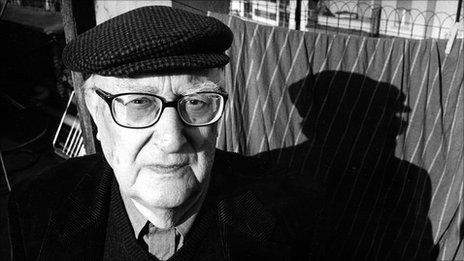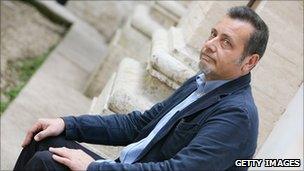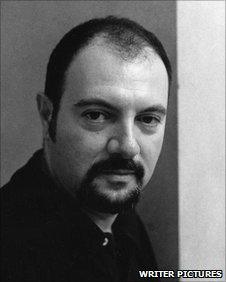Italian crime looks into dark heart of society
- Published

Andrea Camilleri says that crime fiction writers fill a void in society
European crime fiction, particularly Scandinavian noir, is enjoying a huge boom with novels such as Stieg Larsson's The Millennium Trilogy and Henning Mankell's Wallander. But Italian noir is emerging as a force inspired by the dark side of Italian society.
Faced with the grim reality that many murders go unsolved, Italian writers are drawn to stories that offer no simple resolutions or happy endings.
"We write more noir in Italy than traditional thriller. This is because we are more pessimistic about human nature," says Giancarlo De Cataldo, who became a crime fiction writer after serving as a judge.
His experience of meeting members of the infamous Rome gang, the Banda Della Magliana, has inspired his novel Romanzo Criminale.
Corruption and unsolved murders
The story reflects the activities of the gang, which was one of the most powerful Italian criminal organisations during the 1970s and 1980s, controlling drug and gambling networks in Rome, as well as being associated with kidnappings and murders.
"There is a grey zone between the normal citizen, the power, the legal economy and the underworld," says de Cataldo.
"Romanzo Criminale is more than a thriller, it's a historical and political crime novel."
And it is this theme that has come to encapsulate Italian noir novels today. Through their novels, authors are drawing on their experience of another side of contemporary Italy, of organised crime, political corruption and unsolved murders.
"In truth there are few cases that are resolved with definite certainty, and in Italy there is no longer even the certainty of punishment," says Sicilian writer Andrea Camilleri, whose Inspector Montalbano Mysteries explore the mafia.
"Fiction can tend to give the mafia a noble character," he says.
"In the Godfather, for instance, Marlon Brando's incredible performance makes us forget that here is a man ordering killings by the dozen.
"This is the risk that you run that in some way the mafia is glamorised and I refuse to do that."

Author Massimo Carlotto was wrongfully convicted of a murder during Italy's Years of Lead
But the examination of Italy's society and the deep-rooted problems it faces has moral implications which noir writers battle with.
"The poor crime fiction writer begins to ask himself some questions," says Camilleri.
"He says, do I really have to be the one to sew the torn fabric of society?"
Criticising reality
Many Italian crime writers believe they are filling a void by highlighting what they perceive as the corruption and distress at the heart of society.
"Anglo-American novelists have remained novelists. For us it has been necessary to become something more," says author Massimo Carlotto, whose own story could come from the pages of a noir novel.
As a left-wing student protestor during Italy's troublesome Years of Lead from the late 1960s to the early 1980s - an era of bombings and social discontent - Carlotto was wrongly convicted of a murder and spent five years on the run in Central America.
"I was arrested on the basis of a prejudice, and I was quickly declared guilty," he says.
"I had already decided at the trial to get away from this madness by fleeing abroad."
His best-selling novel, The Fugitive, recounts his experience.
"The noir genre allows us to describe and criticise reality," says Carlotto.
He was eventually pardoned in 1991, and today his novels focus on the issues facing Italy's north-east, where he lives.
"No-one does investigative journalism with respect to changes in criminal phenomena in Italy any more. No-one writes about major crimes any more, especially organised crime."
Italy's contradictions
Italy's society today has emerged from its fascist past, and the roots of many Italian noir stories lie in the same period.

Carlo Lucarelli uses Italy's fascist history to examine Italy today
Using the experience of a real-life former policeman who served under Italy's fascist regime, Carlo Lucarelli's novel Carte Blanche portrays what he describes as Italy's "contradictions".
After World World II, Commissioner de Luca, the policeman he created continues in his career, but he now works for a force in a new democratic Italy.
"Commissioner de Luca... is on one hand a good person, a policeman, a detective - the man who in the crime novel will lead us to the truth," says Lucarelli.
"Yet at the same time he is also the instrument of dictatorships, and so he is a man full of contradictions who can live through Italian history and tell us about the contradictions of each period."
Lucarelli says that authors have a shared commitment to write more than simple crime strories.
"Our detectives are all characters who see what is happening in society and suffer.
"They understand that there is nothing that they can do about it and this brings a state of despair."
Italian Noir: The Story of Italian Crime Fiction will be broadcast at 2130GMT on Monday 27th December, 2010, on BBC Four, or catch up afterwards on BBC iPlayer